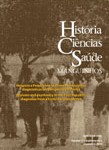June 3, 2021
In the Brazilian public health literature, an association has been drawn between the 1970s health reform movement and what has been called developmentalist health.

People march for a new Constitution in 1987 after the democratic opening. Foto: Erik Barros Pinto / Projeto Radis/ENSP/Fiocruz
In Readings about developmentalist health and interpretations for the Brazilian health reform and public health (HCSM Jan-Mar 2021), Camila Furlanetti Borges and Tatiana Wargas de Faria Baptista researchers at Fiocruz analyze the discourse of two sanitary doctors from the period – Mário Magalhães da Silveira and Carlos Gentile de Mello.
The article argues that the Brazilian Unified Health System – SUS – was created not simply in continuation of developmentalist thinking.
Read in HCSM:
Borges, Camila Furlanetti and Baptista, Tatiana Wargas de Faria. Readings about developmentalist health and interpretations for the Brazilian health reform and public health. História, Ciências, Saúde-Manguinhos [online]. 2021, v. 28, n. 1.
30 years of SUS in our pages Thirty years ago, on September 19, 1990, Law 8,080 was enacted, creating the Unified Health System (SUS). To celebrate this remarkable moment, we highlight some articles and texts already published in our journal and blog about SUS, which is playing a decisive role in this pandemic context.
The construction of the ‘SUS problem’ in the newspaper Folha de S. Paulo Article by Gabriela Martins Silva and Emerson Fernando Rasera
The Sanitation of Brazil: Nation, State, and Public Health, 1889-1930 The acclaimed study of Gilberto Hochman is available for the first time in English.
The right to health The blog of HCS-Manguinhos interviewed two Brazilian experts on Public Health
Health is not a commodity See the Brazilian Contribution (Oswaldo Cruz Foundation and National Health Council) to the Global Conference on Primary Health Care, Astana, October 2018.







